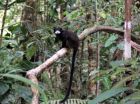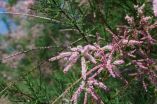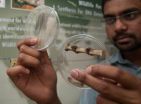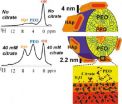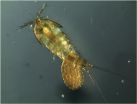Scientists create humanized mouse model for hepatitis C
2011-06-09
Scientists at Rockefeller University and The Scripps Research Institute have developed the first genetically humanized mouse model for hepatitis C, an achievement that will enable researchers to test molecules that block entry of the hepatitis C virus into cells as well as potential vaccine candidates. The finding is reported in the June 9 issue of the journal Nature.
While the hepatitis C virus can infect chimpanzees and humans, scientists have been unable to study the progression of the virus' life cycle or possible treatments in small animal models. The new mouse model ...
THE VELUX Group Wins Design Award for Sun Tunnel Skylight by Lovegrove; Partnership Between VELUX & Green Design Proponent Wins Sought-After 'Red Dot' Label
2011-06-09
A very unusual partnership between the VELUX Group and the internationally acknowledged proponent of Green Design, Ross Lovegrove, wins this year's attractive red dot award "best of the best" for pioneering design.
The sun tunnel by Lovegrove is a contemporary and smooth new product that spreads natural light through the roof to otherwise electrically lit rooms and is a supplement to the ordinary VELUX sun tunnel. The new design represents yet another innovative way to bring daylight into buildings. The "red dot" is a sought-after quality label worldwide. ...
Connection discovered between the nervous system and the vascular system
2011-06-09
Montréal, June 8, 2011 – Dr. Frédéric Charron, researcher at the Institut de recherches cliniques de Montréal (IRCM), and his team have shown for the first time that a key molecule of the vascular system directs axons during the formation of neural circuits. This connection between the nervous system and the vascular system could be a good starting point for the development of therapies for neurodegenerative diseases. The discovery will be published tomorrow by Neuron, a scientific journal of the Cell Press group.
"To properly form neural circuits, developing axons (long ...
Competition between females leads to infanticide in some primates
2011-06-09
An international team of scientists, with Spanish participation, has shed light on cannibalism and infanticide carried out by primates, documenting these acts for the first time in the moustached tamarin (Saguinus mystax). The mothers, which cannot raise their infants without help from male group members, commit infanticide in order to prevent the subsequent death of their offspring if they are stressed and in competition with other females.
"Infanticide is an extreme behaviour, and in most species is used by males to eliminate competitors and make females become sexually ...
VELUX Introduces the Sun Tunnel Skylight Shade
2011-06-09
VELUX America is introducing a manual blackout shade for its Sun Tunnel tubular skylights.
The new accessory utilizes magnets on the top, or non-visible side, of the ceiling diffuser trim ring. When the magnets are in place and the trim ring is reinstalled, a white, fabric-covered disk with a metal outer ring is attached to the diffuser trim ring. The center of the disk has a fitting that connects to a two-piece, 26.5" rod, which is inserted into the fitting and used to attach and remove the accessory shade disk.
The accessory kit (ZTB designation) is available ...
Mountain pine beetle activity may impact snow accumulation and melt, says CU-Boulder study
2011-06-09
A new University of Colorado Boulder study indicates the infestation of trees by mountain pine beetles in the high country across the West could potentially trigger earlier snowmelt and increase water yields from snowpack that accumulates beneath affected trees.
Led by CU-Boulder geological sciences department doctoral student Evan Pugh, the study was undertaken near Grand Lake, Colo., adjacent to Rocky Mountain National Park, an area that has been devastated by mountain pine beetle attacks in recent years. Mountain pine beetles have killed more than 4 million acres ...
Bureau of Prescription Health Gives The Whole Truth (and Nothing But) About Free Medicine at FreeMedicine.com
2011-06-09
Located in Doniphan, MO the Bureau of Prescription Health provides options for people of all ages in the USA who cannot afford to pay for their prescriptions out-of-pocket.
During this time of economic uncertainty, too many Americans live with the fear that they or a family member will not have access to medicines they need because they lack insurance or a drug benefit. Members of "Big Pharma" have collectively pledged, "No one in need of medications will do without them." The Bureau of Prescription Health, along with drug companies in the USA, are ...
The deVere Group Extends Global Presence with a New License Granted in Miami, USA
2011-06-09
This latest addition is the fifteenth office that the deVere Group has opened worldwide in the last two years, however it is the first established presence in the continent.
Nigel Green, CEO of the deVere Group, said: "The deVere Group is already successful in every continent around the world. We are delighted to have been granted a license in this highly-regulated market. The USA has massive potential and we are very excited as a company to provide our services to clients there."
deVere's global presence now extends to nearly 60 offices worldwide. With ...
Tut, tut: Microbial growth in pharaoh's tomb suggests burial was a rush job
2011-06-09
Cambridge, Mass, June 8, 2011 - In the tomb of King Tutankhamen, the elaborately painted walls are covered with dark brown spots that mar the face of the goddess Hathor, the silvery-coated baboons—in fact, almost every surface.
Despite almost a century of scientific investigation, the precise identity of these spots remains a mystery, but Harvard microbiologist Ralph Mitchell thinks they have a tale to tell.
Nobody knows why Tutankhamen, the famed "boy king" of the 18th Egyptian dynasty, died in his late teens. Various investigations have attributed his early demise ...
Is root grafting a positive, cooperative behavior in trees?
2011-06-09
Trees are often viewed as individuals that compete with one another for access to limited resources. But could trees in stressed environments actually benefit from positive, facultative interactions? The authors of a new paper suggest that might be the case for certain tree species—and that it may take the form of root grafting.
Natural root grafting between individuals has been observed in over 150 species of plants around the world. However, while much is known about benefits of merging stem tissues (primarily from horticultural practices), little is known about ...
Anthropologists study autobiographies in Basque of people who took part in the Spanish War
2011-06-09
They say that history is written by the victors. But the combatants, fundamental to the outcome of war, rarely appear in this history – whether victors or vanquished. University of the Basque Country anthropologists Pío Pérez and Ignazio Aiestaran have rebelled against this injustice, "uncovering" the memory of those who fought in the trenches in the 1936 war in Spain. They studied ten autobiographical accounts to produce Oroimen iheskorrak: gerra zibileko sufrimenduaren inguruko hausnarketak, euskaraz idatzitako testigantzen ikerketaren bitartez (Elusive memories: thoughts ...
Lack of relationships, education top list of common American regrets
2011-06-09
Los Angeles, CA (June 8, 2011) Regrets—we've all had a few. Although too many regrets can interfere with life and mental health, a healthy amount of regret can motivate us to improve our lives, say researchers Mike Morrison of the University of Illinois and Neal Roese of Northwestern University in the current issue of Social Psychological and Personality Science (published by SAGE).
The researchers telephoned a representative sample of nearly 400 Americans to ask them about what they regret. The most frequent regrets of Americans are about love, education, and work. ...
Jellyfish blooms transfer food energy from fish to bacteria
2011-06-09
Jellyfish can be a nuisance to bathers and boaters in the Chesapeake Bay on the United States' East Coast and many other places along the world's coasts.
A new study by researchers at the Virginia Institute of Marine Science (VIMS) shows that jellyfish also have a more significant impact, drastically altering marine food webs by shunting food energy toward bacteria.
An apparent increase in the size and frequency of jellyfish blooms in coastal and estuarine waters around the world during the last few decades means that jellies' impact on marine food webs is likely to ...
Penn researchers develop biological circuit components, new microscope technique for measuring them
2011-06-09
PHILADELPHIA — Electrical engineers have long been toying with the idea of designing biological molecules that can be directly integrated into electronic circuits. University of Pennsylvania researchers have developed a way to form these structures so they can operate in open-air environments, and, more important, have developed a new microscope technique that can measure the electrical properties of these and similar devices.
The research was conducted by Dawn Bonnell, Trustee Chair Professor and director of the Nano/Bio Interface Center, graduate students Kendra Kathan-Galipeau ...
New 3-D tumor model
2011-06-09
College Park, Md. (June 08, 2011) – A team of scientists has developed a way to coax tumor cells in the lab to grow into 3-D spheres. Their discovery takes advantage of an earlier technique of producing spherical cavities in a common polymer and promises more accurate tests of new cancer therapies.
As team leader Michael R. King, Ph.D., of Cornell University explains, "Sometimes engineering research tends to be a case of a hammer looking for a nail. We knew our previous discovery was new and it was cool. And now we know it's useful."
Three years ago, the team -- in ...
Ecology biased against non-native species?
2011-06-09
The recent field of invasion biology faces a new challenge as 19 eminent ecologists issue a call to "end the bias against non-native species" in the journal Nature.
Often called aliens, hitchhikers or invasives, some scientists say that non-native species could just as easily be coined "abductees" whose transport links to activities by humans.
The authors of the Nature comments section note that assumptions that "introduced species" offer only deleterious impacts are misguided and "that human-induced impacts, such as climate change, nitrogen eutrophication, urbanization ...
Saving wildlife with forensic genetics
2011-06-09
Wildlife face many threats with spreading urbanization, including habitat loss and inbreeding when populations become fragmented and isolated. It doesn't help that there is a billion-dollar international industry dedicated to the illegal trafficking of wild animals or wild animal parts.
The Conservation Genetics Lab at the University of Arizona is working to conserve and protect wild animals around the world.
"Our work here deals with using genetics for wildlife conservation," said Ashwin Naidu, a doctoral candidate in the School of Natural Resources and the Environment.
One ...
Researchers discover superatoms with magnetic shells
2011-06-09
RICHMOND, Va. (June 8, 2011) – A team of Virginia Commonwealth University scientists has discovered a new class of 'superatoms' – a stable cluster of atoms that can mimic different elements of the periodic table – with unusual magnetic characteristics.
The superatom contains magnetized magnesium atoms, an element traditionally considered as non-magnetic. The metallic character of magnesium along with infused magnetism may one day be used to create molecular electronic devices for the next generation of faster processors, larger memory storage and quantum computers.
In ...
Lifelong gap in health between rich and poor set by age 20
2011-06-09
"We can't buy our way out of ageing," says Nancy Ross, a McGill geography professor. "As we get older we start to have vision problems, maybe some hearing loss, maybe lose some mobility – ageing is a kind of a social equalizer."
Ross is the lead author of a new study about how socio-economic and educational status affects Canadians' health-related quality of life over the course of a lifetime.
"My research looks at how poverty and social disadvantage affect your health status. Our work was about using social circumstances as a lens to look at how people's quality ...
Citrate key in bone's nanostructure
2011-06-09
AMES, Iowa - Bone is one of nature's surprising "building materials." Pound-for-pound it's stronger than steel, tough yet resilient. Scientists at the U.S. Department of Energy's Ames Laboratory have identified the composition that gives bone its outstanding properties and the important role citrate plays, work that may help science better understand and treat or prevent bone diseases such as osteoporosis.
Using nuclear magnetic resonance (NMR) spectroscopy, Ames Laboratory scientist and Iowa State University chemistry professor Klaus Schmidt-Rohr and his colleagues ...
Will psych majors make the big bucks?
2011-06-09
A new crop of college graduates have just landed on the job market. Right now they're probably just hoping to get any job, if at all. However, for psychology majors, the salary outlook in both the short and long term is particularly poor, according to a new study which will be published in an upcoming issue of Perspectives on Psychological Science, a journal of the Association for Psychological Science.
It's generally known that psychology majors don't make a ton of money when they're starting out; they're not like engineering students, many of whom go straight into a ...
How cells' sensing hairs are made
2011-06-09
Body cells detect signals that control their behavior through tiny hairs on the cell surface called cilia. Serious diseases and disorders can result when these cilia do not work properly. New research from UC Davis published this week in the journal Nature Cell Biology provides new insights into how these cilia are assembled.
"It's a basic discovery, but with implications for understanding disease," said Jonathan Scholey, professor of molecular and cellular biology at UC Davis and senior author of the study. Understanding how cilia are assembled and function can help ...
'Thermal pollution' in rivers not fully mediated by gravel augmentation
2011-06-09
Although adding gravel to a river to replace lost sediments won't likely cool the whole river channel, it can create cool water refuges that protect fish from thermal pollution, according to a U.S. Forest Service Pacific Northwest Research Station study.
The research—featured in the June 2011 issue of Science Findings, a monthly publication of the station—is among the first to explore the interplay between sub-surface water flow and temperature in large rivers and is helping to guide river restoration strategies in the Pacific Northwest.
In the study, which began ...
Eating a high-fat diet may rapidly injure brain cells that control body weight
2011-06-09
Obesity among people who eat a high-fat diet may involve injury to neurons, or nerve cells, in a key part of the brain that controls body weight, according to the authors of a new animal study. The results will be presented Tuesday at The Endocrine Society's 93rd Annual Meeting in Boston.
"The possibility that brain injury may be a consequence of the overconsumption of a typical American diet offers a new explanation for why sustained weight loss is so difficult for most obese individuals to achieve," said presenting author Joshua Thaler, MD, PhD, a faculty member with ...
Can evolution outpace climate change?
2011-06-09
Animals and plants may not be able to evolve their way out of the threat posed by climate change, according to a UC Davis study of a tiny seashore animal. The work was published today (June 8) in the journal Proceedings of the Royal Society B.
The tide pool copepod Tigriopus californicus is found from Alaska to Baja California — but in a unique lab study, the animals showed little ability to evolve heat tolerance.
"This is a question a lot of scientists have been talking about," said study co-author Eric Sanford, an associate professor of evolution and ecology at UC ...
[1] ... [6031]
[6032]
[6033]
[6034]
[6035]
[6036]
[6037]
[6038]
6039
[6040]
[6041]
[6042]
[6043]
[6044]
[6045]
[6046]
[6047]
... [7602]
Press-News.org - Free Press Release Distribution service.
